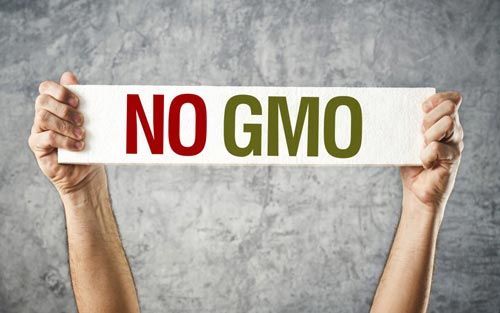Take chances with GMO Seeds? No, thanks

A report released in May 2016 by the federally-supported National Academies of Sciences, Engineering, and Medicine declares that not only are genetically-modified crops safe to eat, but they have no adverse environmental impacts and have cut down on pesticide use.
Genetically Engineered Crops: Experiences and Prospects is the title of the report from the organization that was founded by Congress, which is considering the issue of mandatory labeling for GMO consumer products. We’ll see how that goes. The report states that mandatory labeling is not justified to protect public health.
Excuse me if I find this all a little bit difficult to swallow. Last time I pulled the bed covers off of Congress, I spotted Monsanto officials.
The environmental advocacy group Food & Water Watch (FWW) says that the research arm of the National Academies of Sciences, Engineering, and Medicine has deep ties to the biotech and agricultural industries. FWW says that the organization takes millions of dollars in funding from corporations such as Monsanto, DuPont and Dow Chemical, creating “conflicts of interests at every level of the organization.”
Many of us rely on our gardens as a source of safe and healthy produce. We carefully sow our seeds and tend our plants as our forefathers have for generations, confident that our crops are healthier than the lackluster produce found in grocery stores.
Unfortunately, there’s a silent danger lurking in many of our gardens, an insidious threat that pervades more than 80 percent of the North American food supply. That threat is genetically modified organisms (GMOs). The biotech companies don’t want us to know about the health risks of GMOs and why non-GMO seeds are the only ones that belong in your garden.
A high-stakes experiment
GMO foods are those with DNA that’s been altered in a laboratory. More than just selective breeding, the process introduces completely foreign genetic material, often from unrelated organisms such as bacteria and viruses.
Of course, multinational biotech corporations like Monsanto insist these “Frankenfoods” and the mutant seeds they’re grown from are just as safe as heirloom varieties.
But the truth is, scientists can’t predict what will happen once they insert genes from one species into another. Genes interact in complex ways that still aren’t well understood, and the only thing we do know is that genetic modification can have unintended consequences.
If this large-scale adventure into genetic engineering sounds a little scary to you, you’re not alone. As Martha Grout, M.D. of the American Academy of Environmental Medicine said, it’s the “biggest unfunded human experiment in history.” The worst part is that most of us are unknowing and unwilling participants.
Health risks of GMO seeds and foods
What makes this experiment especially dangerous is the lack of studies on the long-term effects of eating GMO foods. But that doesn’t mean negative health impacts haven’t been reported.
For instance, one study in the New England Journal of Medicine revealed that people allergic to Brazil nuts had allergic reactions after consuming GMO soy containing Brazil nut genes. Another study uncovered herbicidal toxins from GMO corn present in the bloodstream of 93 percent of pregnant women, as well as 80 percent of their unborn babies.
Animal studies also implicate GMOs in a number of serious health problems, including liver and kidney damage. The research speaks for itself:
- Young and old mice suffered significant immune system disturbances after being fed genetically modified corn.
- A study of hamsters fed a diet of GMO soy showed that by the third generation the hamsters could no longer reproduce.
- Scientists showed pigs fed genetically modified corn experienced severe stomach inflammation.
- A study of rats fed GMO corn revealed this diet led to altered blood chemistry, organ damage and possible impacts on male fertility.
Ultimately, it doesn’t matter if scientists don’t fully understand how these mutant foods affect us over the long run. What’s clear is that when it comes to our gardens, non-GMO seeds are the safest choice.
How to protect yourself
The U.S. Food and Drug Administration (FDA) doesn’t require safety testing of GMO seeds and foods, and the biotech industry has poured over $500 million into making sure they don’t have to be labeled. The industry needs you to buy into GMO safety so you’ll ignore the fact that 88 percent of corn and 94 percent of soybeans grown in the U.S. are genetically modified.
With the vast majority of our food supply tainted, the only way to protect yourself is to buy organic food or grow your own from non-GMO seeds. What makes open-pollinated seeds a safer alternative to GMO seeds?
- They contain no foreign genetic material so you don’t have to worry that the food you grow in your own garden is going to give you health problems down the road.
- Foods grown from non-GMO seeds are better for you. Studies show genetic modification can reduce the nutritional value of vegetables by up to 14 percent.
- Heirloom seeds keep your garden healthy and productive. Unlike GMO seeds, open-pollinated seeds don’t harm beneficial insects like butterflies and ladybugs.
Plus, while hybrid seeds only produce well the first year, non-hybrid seeds give you robust plants year after year. That means you can actually save seeds instead of having to buy them every year, protecting your food supply and reducing your dependence on the businesses trying to force GMOs down your throat. And that kind of self-reliance is a goal we can all get behind.
— Frank Bates
© 2016 Personal Liberty ®
http://personalliberty.com/take-chances-with-gmo-seeds-no-thanks/